Key takeaways:
- Prioritize a balanced intake of macronutrients—carbohydrates, protein, and fats—for enhanced energy, muscle recovery, and sustained endurance.
- Effectively timing meals around workouts is crucial; consume a mix of carbs and protein before and after exercise to maximize performance and recovery.
- Stay mindful of hydration; proper water intake and electrolytes are essential for maintaining energy and stamina during training and competitions.
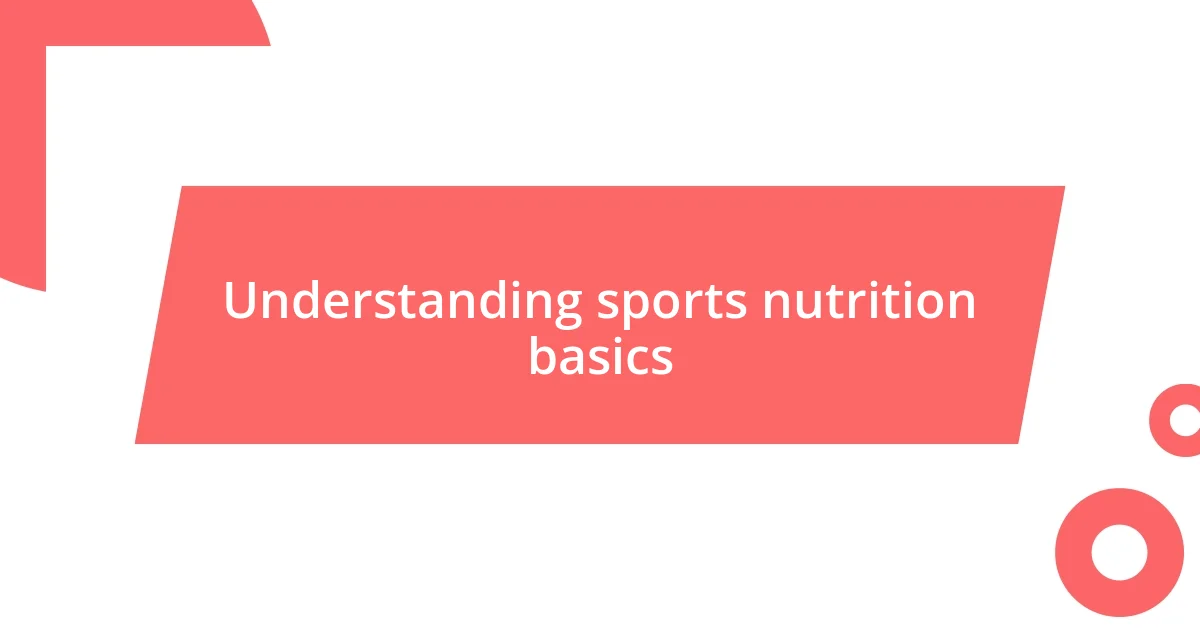
Understanding sports nutrition basics
Understanding sports nutrition is fundamental for any athlete looking to optimize their performance. From my own experience, I remember the first time I learned how essential carbohydrates were for fueling my workouts. I used to think skipping meals would help me feel lighter, but I soon realized that without the right nutrients, my energy plummeted, and my performance suffered.
Protein is another key component that often doesn’t get the attention it deserves. I’ve had my share of friends who complain about hitting a wall during their workouts. When I asked them about their post-exercise meals, many focused solely on carbs without considering adequate protein intake for muscle recovery. Isn’t it fascinating how something as simple as a well-rounded meal can drastically change how we feel and perform?
Lastly, hydration plays a critical role in sports nutrition but is frequently overlooked. I’ve learned that just because you don’t feel thirsty doesn’t mean your body doesn’t need water. I recall a time during a long run when I felt sluggish and realized afterward that I hadn’t hydrated properly. Have you ever been in a similar situation? It’s a reminder that the basics of sports nutrition are not just about fuel; they’re about maintaining overall well-being and peak performance.
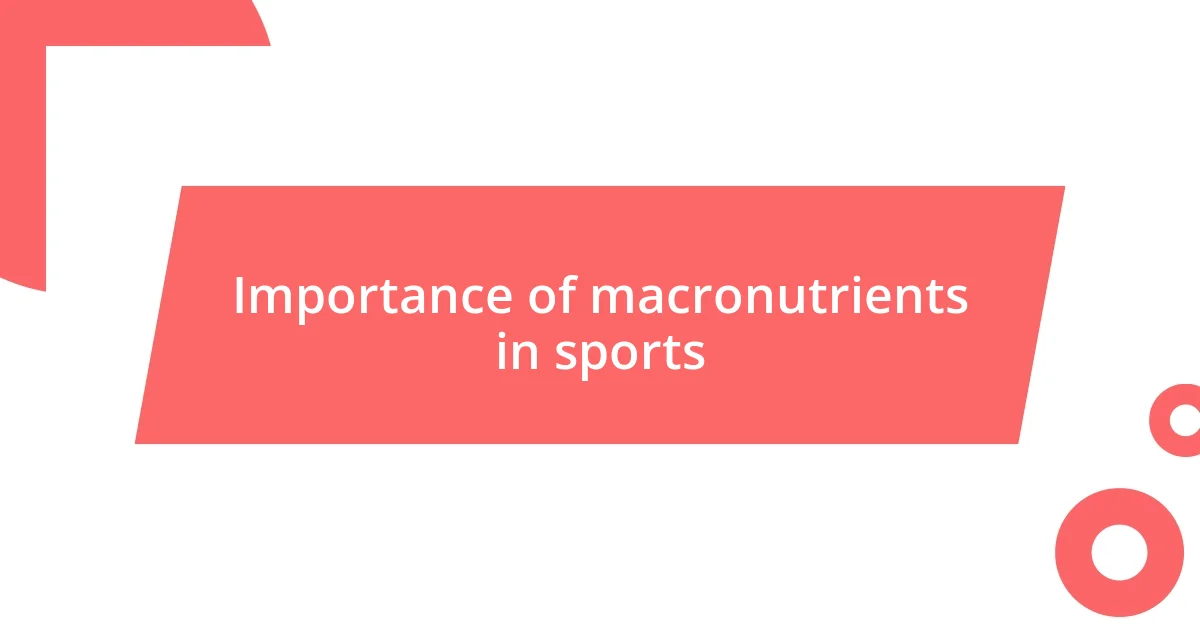
Importance of macronutrients in sports
The role of macronutrients in sports is crucial to achieving optimal performance and recovery. Carbohydrates, for instance, serve as the primary energy source during intense exercise. I remember my first marathon; I relied heavily on a carb-loading strategy. The difference was night and day—I felt energetic throughout the race instead of dragging my feet.
Protein’s significance can’t be understated, especially when it comes to muscle repair and recovery. After my workouts, I would often have a shake packed with both protein and carbs. On those days, I noticed a significant decrease in soreness. Have you ever tried a balanced recovery meal? It’s a game-changer for how your body bounces back after each session.
Fats, while often misunderstood, also play an essential role in sports nutrition. They provide a longer-lasting energy source, especially for endurance athletes like me. I’ll never forget the time I swapped out my usual pre-run snack for a handful of nuts, and instead of feeling depleted midway through, I had sustained energy. Exploring the balance of these macronutrients can truly enhance your athletic journey.
| Macronutrient | Importance in Sports |
|---|---|
| Carbohydrates | Primary energy source for high-intensity activities |
| Protein | Essential for muscle repair and recovery |
| Fats | Provides sustained energy for long-duration activities |

Timing your meals effectively
Timing your meals effectively can significantly impact your performance and recovery. I still remember the first time I experimented with meal timing; I had a big race coming up and decided to have a carb-rich meal an hour before. The boost in my energy felt almost electric. Not only did I crush my goal, but I realized how crucial it is to plan meals around your training schedule.
Here are some key points on meal timing:
- Pre-workout nutrition: A mix of carbs and protein 30-60 minutes before exercise fuels your body and enhances performance.
- Post-workout recovery: Consuming protein and carbs within 30 minutes after your workout helps repair muscles and replenish energy stores.
- Regular meal intervals: Eating every 3-4 hours maintains energy levels and prevents hunger, which can distract during training.
These strategies became my go-to after I noticed how much more energized I felt during workouts and how quicker recovery led to better performances. Have you given any thought to when you’re fueling up? It can make a world of difference.
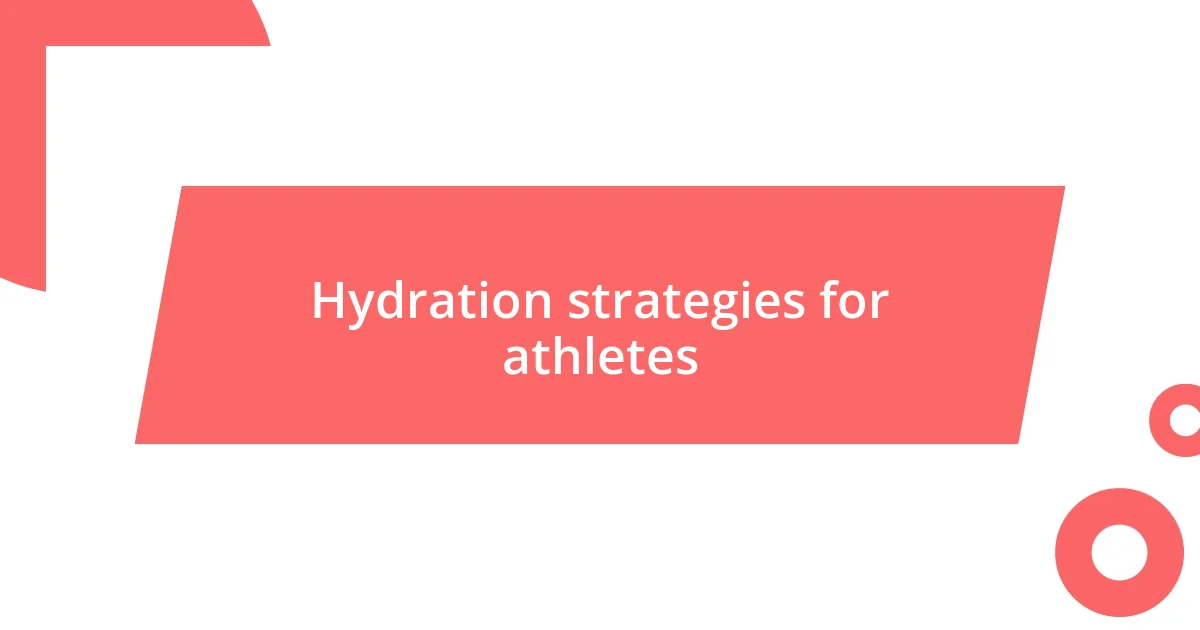
Hydration strategies for athletes
Hydration is often the unsung hero of athletic performance. During my training for a triathlon, I learned the hard way that even slight dehydration can hinder my speed and stamina. One day, I failed to drink enough before a long bike ride and felt an energy dip halfway through. It was a stark reminder that staying hydrated is just as crucial as fueling my body with the right foods.
I’ve found that personalized hydration strategies can make a significant difference. In my experience, I aim for at least 16-20 ounces of water two hours before exercise and then sip continually during my workouts. Recently, I tried adding electrolytes to my water for a longer run, and I could tell we were on to something. It’s fascinating how something so simple can impact your endurance and recovery time.
Have you ever tried to drink water and noticed how your body responds? I often carry a water bottle with me wherever I go, and I’ve seen how simply being mindful of my intake means I can train harder and recover faster. Implementing reminders to hydrate throughout the day can boost your performance too. Why not give it a shot? You might just find that your workouts transform!
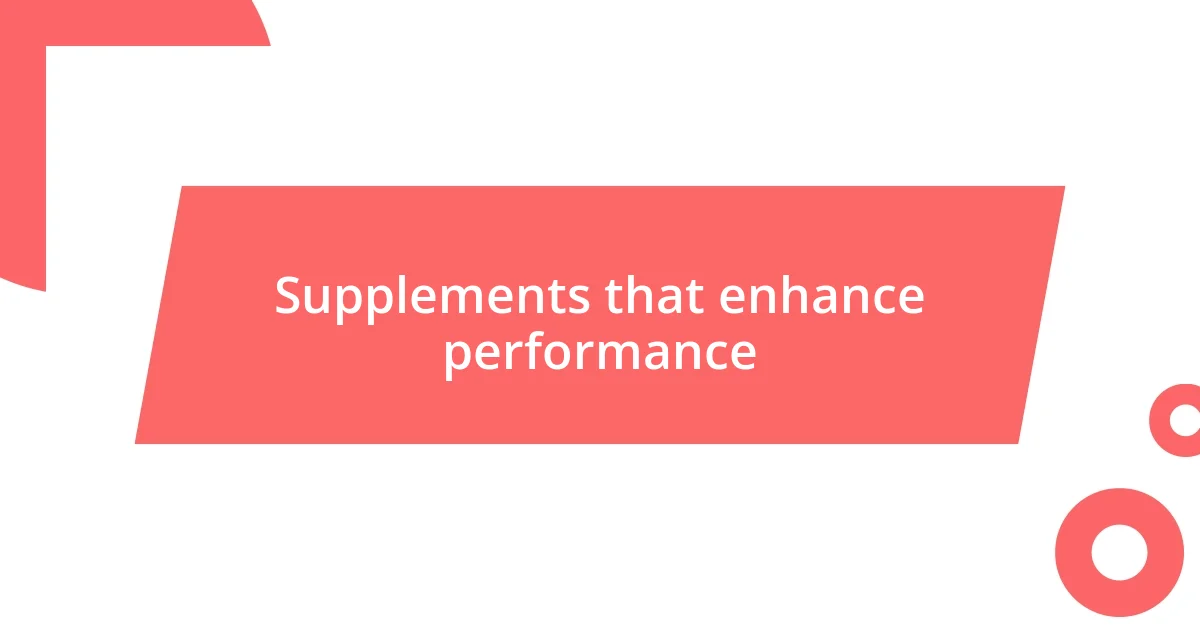
Supplements that enhance performance
When it comes to enhancing performance, some supplements have made a real difference for me. Creatine is one that stands out; I remember the first time I added it to my routine before my weightlifting sessions. The added explosiveness and intensity in my lifts were immediate, making me wonder how I ever trained without it. This compound not only boosts strength but also aids muscle recovery. Have you considered incorporating creatine into your regimen? It might just be a game-changer.
Another supplement that I’ve found beneficial is beta-alanine. I was skeptical at first, but after a few weeks of consistent use, I noticed a significant decrease in my muscle fatigue during high-intensity workouts. It was enlightening to push through those last reps where I usually would have given up. For anyone seeking that extra edge, beta-alanine can really help you outperform your previous limits. How often do you push your own boundaries in training?
Lastly, don’t overlook the power of branched-chain amino acids (BCAAs). After long training sessions, I used to suffer from a lot of post-exercise soreness. Incorporating BCAAs into my recovery routine transformed that experience. It’s remarkable how quickly I bounced back and felt ready for the next session. Have you ever felt the struggle of starting again after a tough workout? These little gems could be what you need to keep your energy and enthusiasm high.
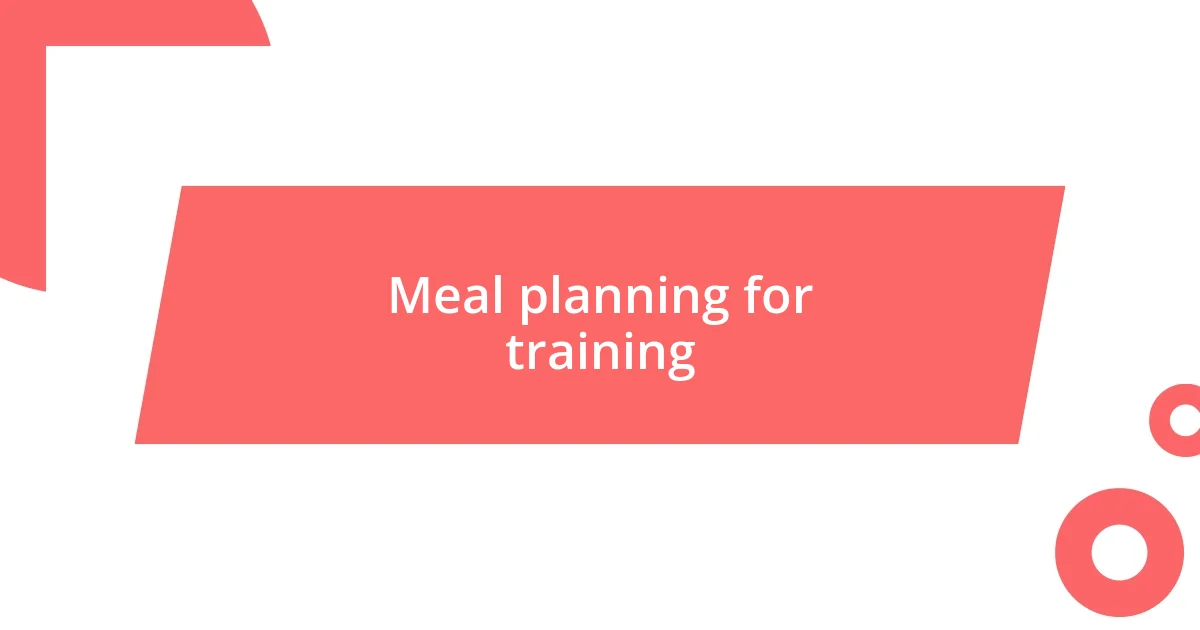
Meal planning for training
Meal planning for training is an essential aspect that I wish I’d mastered earlier in my athletic journey. I vividly recall the chaotic mornings when I’d scramble for breakfast right before heading out, only to realize I needed more than just a quick granola bar. Establishing set meals that include a balance of carbohydrates, proteins, and healthy fats has not only made my mornings smoother but has also significantly boosted my energy levels during intense training sessions.
When planning my meals, I often focus on nutrient timing. I’ve found it beneficial to include a good mix of carbs and protein within 30 minutes post-workout. One day, after a particularly grueling leg day, I blended a protein smoothie with banana, spinach, and almond milk, and the recovery was phenomenal. How do you ensure you’re feeding your body properly after workouts? Sometimes, I even prepare meals in bulk on weekends, allowing me to grab healthy options in a hurry, knowing my body is getting the fuel it needs without the last-minute stress.
I urge you to consider how meal planning can change your perspective on food and training. I remember the first time I sat down to create a weekly menu. It felt daunting at first, but once I embraced it, my training transformed. I became more in tune with how different foods impacted my performance and recovery. Have you ever thought about the role that meal preparation plays in your success as an athlete? It’s liberating to feel organized and energized, paving the way for more focused and effective training sessions.
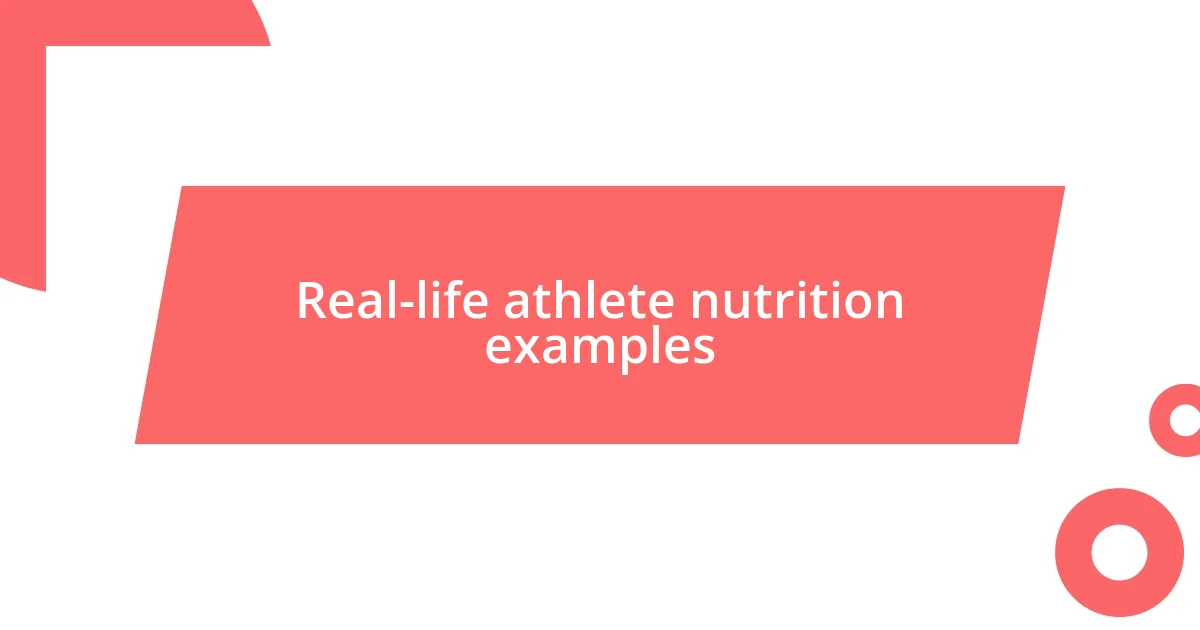
Real-life athlete nutrition examples
During my time as an athlete, I’ve honed in on how different foods can enhance performance. I remember when I started experimenting with quinoa. At first, I thought it was just another trendy grain, but after a couple of weeks of incorporating it into my meals, I noticed a marked increase in my endurance during long runs. Have you ever felt that shift in energy from a seemingly simple dietary change? It’s amazing how such small adjustments can transform not just your meals, but your overall training experience.
A standout for me has been the integration of sweet potatoes into my post-workout routine. There was a day when I was racing against the clock, trying to recover after a tough sprint session. I whipped up a quick meal with baked sweet potatoes topped with grilled chicken and some steamed broccoli. The combination seemed to work wonders! It not only replenished my glycogen stores but also left me feeling satisfied without that sluggish heaviness. How do you feel after your post-workout meals? Finding the right balance can make all the difference.
I’ve also seen the impact of hydration in my nutrition journey. On a particularly hot day during the summer training, I remember neglecting my water intake and felt drained halfway through my workout. That experience led to me prioritizing electrolyte-rich drinks, especially after intense sessions. Now, I make it a point to have coconut water handy, as it provides a refreshing boost without the artificial additives. Have you truly considered your hydration habits? It’s eye-opening how something as simple as staying hydrated can dramatically influence your performance.














